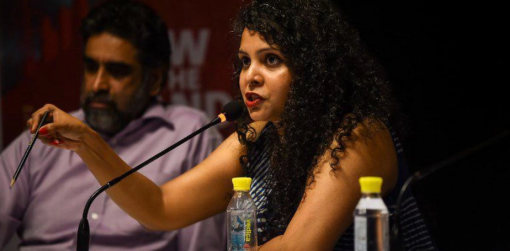
The United Nation’s Human’s Rights body issued a statement on Thursday calling on the authorities in India to act urgently to protect journalist Rana Ayyub, who has received death threats following an online hate campaign.
Rana Ayyub has been on the receiving end of intense abuse, ever since she released her book Gujarat Files in 2016. In the book, Ayyub has published secretly recorded interviews that played a role in implicating bureaucrats and politicians who had remained complicit or had helped in aggravating the 2002 Gujarat riots. Since the book’s release, she has been getting constant gang rape as well as death threats. Fake quotes have been often attributed to her on Facebook, Twitter and WhatsApp, which claim that she has supported child rapists or has professed her hate for India. A pornographic video that claimed to have Ayyub in it, had surfaced a while back and Ayyub had filed an FIR in this regard.
Television anchor and senior reporter Ravish Kumar has also been subjected to similar intimidation and cyberbullying, again for taking positions that evidently infuriated supporters of the ruling dispensation. And the list goes on.
Journalists are being constantly silenced for revealing the ugly truth of the rich and famous. In an annual report by Reporters without Borders, India ranked 138th among 180 countries in the Press Freedom Index. The report blamed the “physical violence” against journalists like Gauri Lankesh as the key reason behind the country’s low ranking.
This is a commentary on the state of Indian democracy, where the government has reacted to neither of these attacks on the Fourth Estate. The inaction and apathy prevails despite the cautionary precedent of Gauri Lankesh’s murder and the gleeful reactions to it from trolls known to be issuing murder/rape threats and hate speech couched in the language of nationalism.
If the Radia tapes scandal of 2010 was about the influence evidently wielded by a corporate lobbyist over senior journalists, the two tranches of videos released by Cobrapost have raised questions about the proclivity of media owners and managers to disregard journalistic ethics in deference to dominant political interests. The website exposes the vulnerability of editorial space to the apparent willingness of owners and managers of leading media organisations to promote the Hindutva agenda under the guise of advertisements and advertorials.
Hence on its fourth anniversary, the Foundation for Media Professionals has called upon the government to respond to these telling events, as this shows the wide gulf in the rhetoric and reality of the government's commitment to the freedom of expression. The government and the ruling party cannot any longer shirk their responsibility of checking this alarming trend.
The Foundation demands:
“1.That the Prime Minister should, without any further delay, call a press conference to uphold, if nothing else, the media’s right to question any holder of that high office.
2. That exemplary action should be taken against trolls harassing journalists like Ms Rana Ayyub and Mr Ravish Kumar.
3. That the Prime Minister, his ministers and party leaders should stop following social media trolls and cyber bullies.
4. That the ongoing exercise of framing regulations for online media should ensure that the proposed watchdog is independent of not only the Government but also the market.
5. That as regards Cobrapost’s revelations, civil society organisations, including political parties and media associations, should condemn those media owners and managers who have been caught on camera saying that they were already striving to promote sectarian ideologies or willing to fan communal hatred for a price.”




